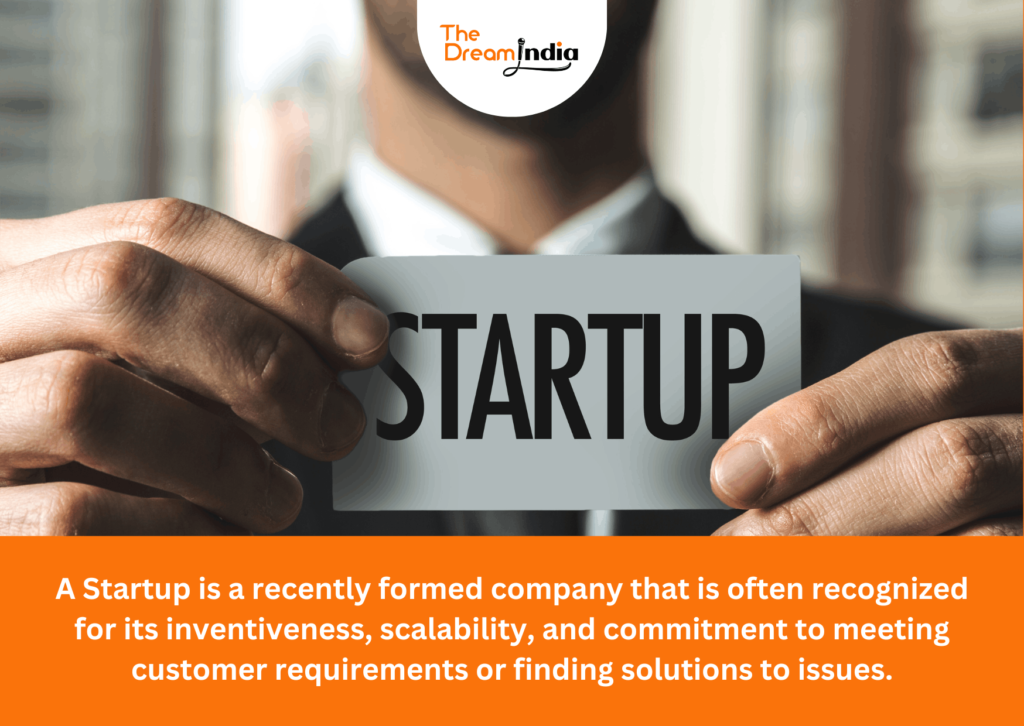
A startup or start-up is a company that is in the early stages of its development. Generally, a startup is started by 1-3 founders with the main focus on capitalizing on a perceived market demand by developing a viable product, service, or platform.
Today, we witness a break from traditional career beliefs and welcome a new generation where startups are welcomed as dynamic career opportunities where innovation and growth are seen to be the brightest prospects.
However, the journey of beginning a startup is not an easy sail, it is filled with challenges, unforeseen outcomes, and uncertainties.
Read on to learn more about the benefits, eligibility, valuation, tax exemptions, and incentives of a startup.

What is A Startup?
A Startup is a recently formed company that is often recognized for its inventiveness, scalability, and commitment to meeting customer requirements or finding solutions to issues.
Startups typically target existing markets and experience rapid growth in industries like technology, biotechnology, e-commerce, and finance, unlike traditional businesses.
Why do people start a startup?
Starting a startup can involve risks. Yet, many strive to step into the path of entrepreneurship and choose to follow their passion to walk on the path less travelled or choose a path that is different from the most accepted traditional professions.
An individual whose mindset is driven by ideas has the desire to make their ideas take a definite shape. If the ideas are innovative and practical, the only route to explore and experiment is starting a startup wherein the ideas can be executed. It is because they will enjoy the independence to experiment with their ideas without obstruction or rejection enjoying the liberty of being their own boss.
People who desire freedom and flexibility without having given the key to control them to anyone welcome entrepreneurship.
Moreover, the dream of winning higher rewards attracts many to bring up startups. There is no fixed salary or wait for an increment in the salary.
A successful execution of ideas can give huge financial rewards. Challenges well fought can lead to significant financial profits. Besides, this journey of startups offers growth opportunities – both on the personal and professional front.
However, the motivation to choose this path may vary from one person to another including internal and external factors of life.

What Are the Benefits of A Startup?
The benefits of a startup are listed below.
- Novelty and Creativity
- Flexibility and Dexterity
- Plausible for High Returns
- Influence and Legacy
Novelty and Creativity
Innovation is the base of startups- nurturing an environment where novel ideas are cultivated and transformed into worthwhile products or services.
This art of creativity is the route toward pioneering solutions that can revolutionize industries.
Flexibility and Dexterity
The beauty of startups is that the market is never constant. They are flexible and can adapt quickly to the dynamics of the changing market and get ready for changing customer preferences.
It is because of their agility, that startups can take advantage of opportunities and change course when necessary to stay one step ahead of their rivals.
Plausible for High Returns
There is always an underlying string of huge risks in the startups. However, they also possess the potential to produce great returns on investment.
Fast-growing, profitable firms that acquire striking investments and profitable exits through acquisitions or initial public offerings can provide investors and founders with huge returns.
Influence and Legacy
Today, Entrepreneurship is the most sought-after career opportunity to create an enduring impact on society.
By addressing insistent challenges and introducing innovative solutions, startups contribute to social progress and renovation and leave behind a meaningful inheritance.
What are the Eligibility Criteria for A Startup?
The eligibility criteria for a startup demand an entity get registered as a private limited company, a partnership firm, or a limited liability partnership (LLP).
The factors below are regarded as the prospects for a successful startup.
- Innovative Idea: Begin with an exceptional and convincing business idea that can address market demands or requirements or find solutions to problems.
- Market Validation: Research is the base of every business. Thorough market research must be done to authenticate the demand for your product or service.
- Location: Will your business opt for a physical office or operate online, if a physical office, what will be the location or will it be work from home are some specific needs that must be decided by the entrepreneurs. The choice of the location must take into consideration the following factors- target market, access to resources, and the nature of the product or service aimed to launch.
- Legal Construction: Before beginning a business, the most appropriate legal construction must be chosen or found. There are options like sole proprietorship, partnership, or incorporation as a limited liability company (LLC) or corporation having their own implications for liability, taxation, and governance; however, the selection demands very careful consideration.
- Team: You may be the brain, but you need an active body to follow your brain. Your team is your body. Henceforth, your team must be talented, hardworking, and diverse with complementary skills and a common and progressive vision.
- Scalability: Confirm that your business model is scalable which would lead to rapid growth and extension.
- Financial Planning: Weal planning can be a disaster. A strong business plan with solid preparation and financial predictions is a must to appeal to investors and sustain operations.
What is the Valuation of a Startup?
The estimation of a startup figures out the quality and the stride of the company. However, factors like fluctuating market conditions, low revenue, and unclear prospects, challenge the process of assessment.
How to Approach For a StartUp Valuation?
Traction: Indicators such as user engagement, customer acquisition, and revenue growth are what investors look for. A decent and expanding customer base, rewarding marketing techniques, and a direct route to profitability raise the worth of a startup.
Founding Team: The founding team plays a critical role in the valuation of a startup. Investors assess the team’s experience, expertise, and track record to gauge the startup’s potential for success. A team with a proven track record and diverse skill sets can enhance the startup’s valuation.
Working prototypes: They are MVPs (Minimum Viable Products), a convenient device for startups to exhibit their product or service’s essence and future lurking market. When companies can demonstrate to investors that they can address customer requirements and have actual offers, investors are more likely to value them higher.
Supply and Demand: Deciding or accessing the market interest in the venture is crucial to its estimation. A firm with little competition and high demand is probably going to produce a greater price. On the other hand, startups in crowded or specialized areas can have trouble fetching greater prices.
Tendencies and Industries: The value of a startup depends on the Impending tendencies and fluctuations of the industry. Due to their capabilities for interruption and innovation, startups in high-grade sectors like technology, healthcare, or renewable energy may obtain greater valuations.
Profit margins: Profit margins are crucial in valuation as startups do have the capabilities for distant future growth and profits, and so the investors tend to put a priceless value on them with gross profit margins.
To arrive at a fair and accurate value, it is imperative to carry out extensive due research, confer with industry experts, and employ valuation techniques including discounted cash flow (DCF), comparable company analysis (CCA), and market multiples.
What Are the Tax Exemptions and Incentives for Startups in India?
Income Tax Exemption: Income tax exemption is available to startups that have received certification from the Department for Promotion of Industry and Internal Trade (DPIIT) for a predetermined amount of time. For any three consecutive assessment years within their first ten years of incorporation, qualifying startups can take advantage of a 100% tax exemption on profits under Section 80-IAC of the Income Tax Act.
Angel Tax Exemption: The government has lifted the so-called “angel tax” on investments made by angel investors to facilitate startup funding. This tax was levied on the quantity of shares issued by unlisted corporations that exceeded their fair market value.
Tax Exemption on Capital Profits: Section 54GB of the Income Tax Act implies that capital gains from the sale of residential real estate may be spent in qualified startups to be entitled to a capital gains tax exemption as per section 54 GB of the Income Tax
Tax Holiday Biotechnology startups: The biotechnology industry is eligible for a tax holiday lasting up to ten years if they invest in certain biotechnology companies as per Section 35 D of the Income Tax
R&D Deductions: Under Section 35(2AB) of the Income Tax Act, startups that conduct research and development can deduct up to 150% of their expenses.
GST Benefits: Startups can take advantage of the GST composition scheme and pay a reduced tax rate if their turnover is less than Rs. 50 lakhs.
Customs Duty Exemption: Under specific programs like the Startup India initiative, startups can also benefit from customs tax exemptions on imported items for research and development (R&D).
Tax privileges minimize the financial burden that startups face in the early stages and promote innovation and employment growth within the Indian economy. However, businesses must adhere to the government’s regulations and restrictions.
What are the 6 main types of startups?
The 6 main types of startups are Scalable Startups, Large Company Startups, Small Business Startups, Social Entrepreneurship Startups, Lifestyle Startups, and Buyable Startups.
The other startup types include SaaS startups, Education startups, Offshoot startups, Fintech startups, and many more.
What Are Government Schemes for StartUps in India?
The Government Schemes for StartUps in India are listed below.
- Startup India initiative
- Startup India Seed Fund Scheme
- Atal Innovation Mission (AIM)
- Credit Guarantee Fund Trust for Micro and Small Enterprises (CGTMSE)
- Multiplier Grants Scheme (MGS)
- Multiplier Grants Scheme
- Pradhan Mantri Mudra Yojana (PMMY)
- Dairy Entrepreneurship Development Scheme (DEDS)
- Credit Guarantee Scheme for Startups (CGSS)
- Ebiz Portal
- Software Technology Parks of India (STPI)
- MUDRA Banks
- National Startup Awards
- Single Point Registration Scheme
- Design Clinic Scheme
- High-Risk and High-Reward Research
- SAMRIDH Scheme
- Aatmanirbhar Bharat App Innovation Challenge
- ASPIRE
- Extra Mural Research or Core Research Grant (CRG)
- MSME Loan Scheme in 59 Minutes
- Marketing Support Scheme
When Is A Startup Not A Startup Anymore?
A business when graduates to an enterprise, is no longer regarded as a startup. The characteristics that distinguish an organization from a startup are maturity, scalability, and consistent growth.
While there are many definitions of startups based on context and industry standards, a firm transitions from startup to enterprise when it reaches specific revenue, employee, valuation, and market presence benchmarks.
- Revenue and employment criteria: A business may no longer qualify as a startup if it exceeds specific revenue and employment criteria. The venture is no longer a startup if any business has a hundred workers and annual revenues of more than $50 million.
- Acquisitions & worth: A business may no longer qualify as a startup if it has acquired other businesses or if its worth is beyond a predetermined level, such as $500 million. Startups that become successful enough to reach important valuation milestones or go through mergers and acquisitions become established businesses.
What Are the Most Valuable Leadership Skills A startup Founder Needs?
The 11 most valuable leadership skills a startup founder needs are listed below.
- Optimism
- Focus and flexibility
- Appetite for knowledge and education
- Analytical and detail-driven
- Cognizant of the industry
- Decision-making
- Embrace failure
- Will to start over
- Open with others about ideas
- Empathetic on multiple levels
- Patient with the process
Conclusion
The trending term ‘startup’ may sound intriguing, but it is no doubt challenging. Passion, dedication, and of course, a well-set strategy and good reach of resources can help defeat the challenges. It is of utmost necessity to understand the nuances of the startup ecosystem.
Now, with the constant support and encouragement from the government, youth today possess a wide range of career opportunities with their unique ideas rightly blended with a clear vision, determination, and patience.
Startups can do wonders in the growth of an individual as well as the nation by creating jobs and making a perpetual impact on the world.





